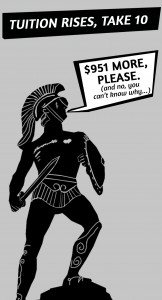USC should be transparent about tuition
As thousands of USC students learned last month when they opened their USC e-bill, tuition increased by $951 for the Fall 2015 semester. The latest in a trend that has persisted for the last 10 years, USC’s tuition hikes put the University’s lack of transparency concerning tuition expenditures under the microscope as students pay more without learning why.
It appears the University expects students to trust that increases in tuition are necessary to maintain its quality of education. But national research points to the arbitrary nature of increases in private research university tuition. According to the Bowen effect, established by economist Howard Bowen, universities increase tuition not because they are forced to do so, but rather because they have the ability to do so without affecting the number of students attending. Colleges exploit the extraordinary demand for higher education by raising the price of attendance at a rate exceeding that of inflation.
Assuming USC follows this model, its tuition increases benefit the University at the expense of students. The tuition hikes take advantage of the near necessity of a college education in today’s professional landscape while demonstrating an unacceptable lack of appreciation for students’ circumstances. USC already charges one of the highest tuition rates in the United States, and as a nonprofit organization committed to its students, it should be mindful of their diverse financial backgrounds.
It’s possible USC doesn’t follow this model. However, it’s impossible to know as students have no clear resource to find out how their tuition dollars are being spent. Given already high and annually increasing rates, it is irresponsible for the University not to be transparent about its spending.
Based on the Bureau of Labor Statistics’ Consumer Price Index, if USC had been increasing tuition solely for inflation since 1995 — the earliest year for which tuition data is available from USC — fall tuition should have increased from $9,123 in 1995 to $14,285 in 2015. At $24,732 for the Fall 2015 semester, USC has more than $10,000 to explain in extra cost of attendance.
USC’s method of informing students of tuition hikes — a higher number on the semester bill — also demonstrates that the University is out of touch with students’ needs. This lack of communication between students and the University is apparent in the prominent “Subject to Change Without Notice” disclaimer displayed on the USC Schedule of Classes “Tuition and Fees” page.
If USC is increasing tuition exclusively to pay for the rising cost of education, there should be standard procedures to inform students well in advance of how much tuition will increase and the reasons for the increase. Some families, especially those who may be struggling to pay already, might be put over the edge by this sort of tuition hike. Regardless of whether USC has raised tuition arbitrarily, tuition hikes still contribute to an environment in which a better standard of education is based on the income of one’s parents. USC’s efforts to attract the most talented students via high school programs, grants and scholarships will be ineffective if the baseline tuition is so high that many students cannot afford it.
In a time when income inequality and student loans are major talking points for presidential candidates and education leaders alike, creating a system in which students from more affluent backgrounds have an advantage is unethical. Tuition hikes blatantly ignore the needs of what the University refers to as its primary responsibility in its mission statement: the students.
If the University wants to stay true to its mission, it must do two things: First, only raise tuition when it serves a concrete purpose that will benefit each individual student. Second, proactively communicate to students a breakdown of how their money is being spent. Indeed, if USC is genuinely using this extra money for necessary student costs, there is no reason for the University not to be transparent.
Daily Trojan Fall 2015 Editorial Board

